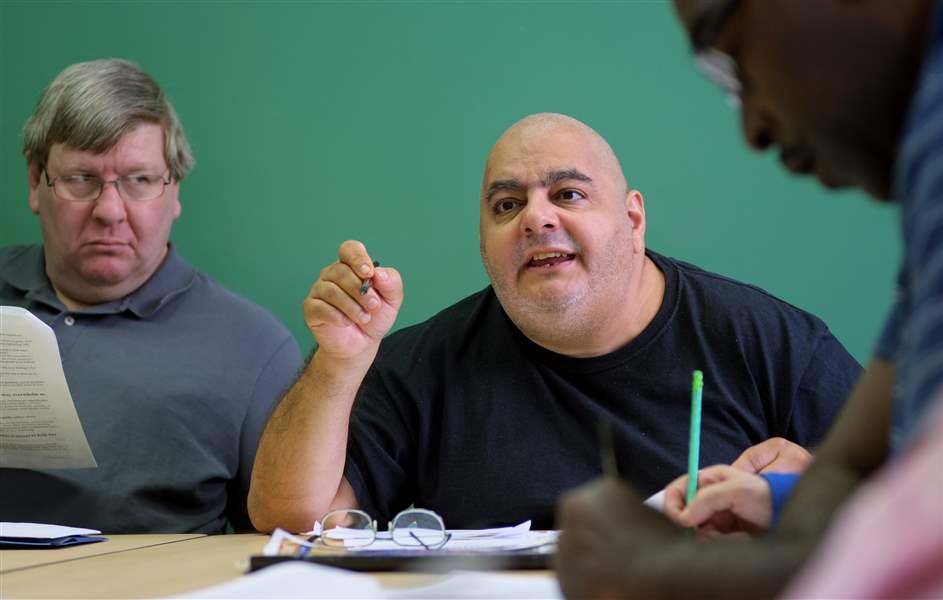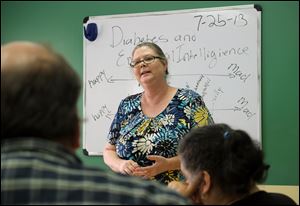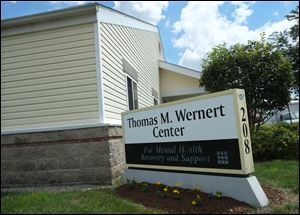
MEDICAID HEALTH HOMES
Ohio initiative unites physical, mental care
Lucas Co. on forefront of integrated approach
12/9/2013
Mark Sahadi makes a point in a diabetes support class. He says he learns something each week that helps him understand both mental illness and diabetes.
The Blade/Dave Zapotosky
Buy This Image

Mark Sahadi makes a point in a diabetes support class. He says he learns something each week that helps him understand both mental illness and diabetes.
Second of two parts
For Mark Sahadi, diabetes has been hard to combat while fighting against another enemy: Depression.
For more than five years, the 53-year-old Toledo resident has suffered from a severe form of depression that caused him to lose his job, turned him away from a healthy diet, and exacerbated his physical condition.
“It’s like a domino effect: There are good days and bad days, and when I have a bad day, I feel like I just want to eat a bunch of doughnuts,” Mr. Sahadi said.
In 2008, he found his way to the Thomas M. Wernert Center, a mental health recovery and support center in Toledo, which provides education classes that help people learn to live with mental illness. He now attends a weekly program dedicated to discussing all aspects of Type 2 diabetes — from new treatments to the emotional effects of the disease.
PART ONE ARTICLE: Ohio battles to care for the mentally ill
Established last year, the Diabetes Support program was introduced to assist clients like Mr. Sahadi who suffer from both diabetes and mental illness — two conditions often deeply interconnected in adults, said Kelly Skinner, executive director of the Wernert Center.
Mr. Sahadi said with the help of the program, he is now at a point where he feels stable and that he learns something new each week that helps him better understand both diseases.
The program furthers the center’s mission of addressing mental illness in a comprehensive manner: For years, the center has offered a series of educational programs and support groups aimed at fostering mental as well as physical wellness, including annual screenings for vision, blood sugar, blood pressure, and cholesterol.
“We’ve focused not just on mental health, but on total wellness,” Ms. Skinner said. “When you talk about mental health care, physical health care has to be included in the conversation.”
“Mental illness is not an isolated public health problem,” said Pamela Hyde, substance abuse and mental health administrator for the Ohio Department of Mental Health.
Mental illness often is associated with medical conditions such as cardiovascular diseases, diabetes, tobacco addiction, and obesity, to the extent that adults living with serious mental illness die on average 25 years earlier than other Americans, according to statistics from the National Association of State Mental Health Directors.

Katie Phillips leads a diabetes support class at the Wernert Center. Diabetes and mental illness are viewed as often deeply connected in adults. Research points to a link between treatment of mental illness and the reduction of physical disorders.
Integrated care
The Wernert Center is just one example of how the mental health community is moving toward a more holistic approach to treatment because of research that points to the link between treatment of mental illness and the reduction of other physical disorders. This new focus, both in Ohio and in Lucas County, is on the integrated care model, officials said. Integrated care has proved so successful in fostering recovery that Ohio has launched a new statewide initiative called “Medicaid Health Homes” that is entirely dedicated to integrated care for individuals suffering from severe mental illness.
Despite the name, the health homes are not really buildings where patients live. Instead the term refers to a mental health agency serving as a “home base” for clients and coordinating all the different services used by an individual with severe mental illness. The doctors, the social worker, the nutritionist, and all the other specialists that oversee a client stay connected through the health home.
Tracy Plouck, director of the Ohio Department of Mental and Addiction Services, called the initiative “an attempt to break down the barriers that currently exist between physical health care and mental health service.”
Before the launch of the Medicaid Health Homes initiative, Ohioans with serious and persistent mental illness received physical health benefits through Medicaid and behavioral health benefits through the Ohio Department of Mental Health and Addiction Services — a system that created confusion among customers and hindered coordination among physical and mental health providers.
The Medicaid Health Homes initiative started in October, 2012, with funding from the 2011 state budget. Ohio Gov. John Kasich authorized the creation of a system of “health homes” in five counties — Adams, Butler, Lawrence, Lucas, and Scioto — as pilot programs with plans to establish them eventually around the state. The program was slated to be expanded to other counties this fall, but the Ohio Department of Mental Health and Addiction Services has decided to spend more time studying the results from Phase One of the program. So for now the program remains in place in just the initial five counties, including Lucas.
“Health Homes remain a priority, and we are committed to assuring success and sustainability; however, the exact timeline for implementation remains undetermined at this time as we continue to work through the stakeholder process,” said Eric Wandersleben, the department’s director of media relations and outreach.
The agencies selected provide medical, behavioral, and long-term care for the clients. The clients have access to pediatricians, dentists, nutritionists, and other specialists to coordinate and integrate their care; in addition, they will receive reminders regarding regular checkups as well as services such as transportation and child care. The five agencies then are fully reimbursed for the services provided on a monthly basis for at least two years.

At the Wernert Center, 208 W. Woodruff Ave., ‘we’ve focused not just on mental health, but on total wellness,’ says its executive director, Kelly Skinner.
Toledo at forefront
Before the Health Homes initiative, several clients at Unison Behavioral Health Group in Toledo had trouble connecting to primary care services. Their behavioral health needs would be treated, but many family physicians would refuse to take care of their physical needs — from smoking cessation to nutrition care to blood pressure control.
“Those of us who have been in this field for long enough always talked about how much we need integrated care,” said Courtney Weiss, Unison chief operating officer.
Unison is one of the mental health providers selected by the Ohio Department of Mental Health to roll out the Medicaid Health Homes program — an initiative that Ms. Weiss called a “godsend” to the community.
In addition to Unison, two mental health agencies based in Toledo were certified as health homes last October: the Zepf Center and Harbor.
Lucas County is the only region in Ohio to house three health homes — a record that “speaks to the progressives” of the local mental health providers, according to Scott Sylak, executive director of the Lucas County Mental Health and Recovery Services Board.
For years, Mr. Sylak said, local mental health agencies have adopted a comprehensive approach to mental illness, “moving beyond traditional treatment models.”
For instance, the Wernert Center developed its diabetes program, as well as a leadership education program dedicated to discussing leadership qualities, group dynamics, and even basics of the U.S. governmental system — skills that, according to Ms. Skinner, are necessary tools toward full recovery.
Unison also offers programs designed to foster recovery and reduce the number of hospitalizations: The Genesis Partial Hospitalization program, for instance, helps individuals in crisis stabilize through daily support groups that include activities such as art therapy and writing workshops.
Likewise, Harbor has been seeking to diversify its programs through partnerships with Toledo Public Schools, ProMedica, and the Workforce Development Agency: for years, they have been offering vocational services, programs designed to assist children, and onsite primary care for patients.
The Zepf Center also has been working toward integrated care for more than four years. In partnership with the University of Toledo Medical Center (the former Medical College of Ohio Hospital) and the Neighborhood Health Association, the agency provides clients with access to primary care and keeps them out of more expensive settings such as hospitals and nursing homes.
“For years, we’ve been ahead of other counties in our efforts to combine physical and mental care,” said the Zepf Center’s executive director, Jennifer Moses.
As the Ohio Department of Mental Health and Addiction Services prepares to implement the initiative in the rest of the state, the introduction of Mental Health Homes in Lucas County has been a “breath of fresh air,” according to John Betts, executive director of Harbor.
“You can’t treat people in silos. You have to treat them as a whole,” Mr. Betts said. “For the first time now, we are able to treat people with severe and persistent mental illness in an integrated fashion.”
Contact Marlene Harris-Taylor at: mtaylor@theblade.com or 419-724-6091.